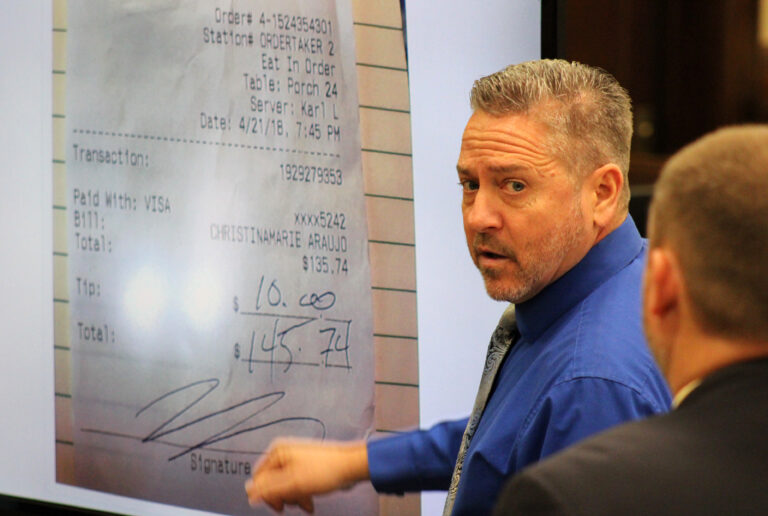Legacy Post Disclaimer
This is a #Legacy post imported from The Apalachicola Time’s previous platform. If you’re experiencing issues with this article, please email us at news@nevespublishing.com.
Disney bill will dissolve Eastpoint water district
A just-passed Florida law that puts an end to a special district that for decades has enabled Disney World to govern its land use, fire protection and various infrastructure will also mean the dissolution of the Eastpoint Water and Sewer District, along with four other special districts.
With the Florida Senate passing the bill along a largely party line vote Wednesday, and the House expected to do so Thursday, local officials are moving to take advantage of a provision in the new law that enables the districts to be re-established prior to their sunsetting in June 2023.
If and when that re-establishment happens – which requires the blessing of both Franklin County commissioners and the Florida legislature – State Rep. Jason Shoaf is signaling he would be willing to support an expansion of the EWSD’s boundaries.
“I’m not going to support an expansion unless the people want it,” said Shoaf, in a telephone interview Wednesday. “I have no intention of adding anything except to bring it (the district) up to snuff. If they’re able to properly poll the people, I would be open to going forward with expansion.”
Shoaf plans to vote yes when it comes before the House, while State Sen. Loranne Ausley voted no on the bill, as Democrats argued the measure, backed by Gov. Ron DeSantis, is retribution against Disney for taking a stand against a bill the governor signed into law that restricts instruction about gender identity and sexual orientation in schools.
The measure, which critics call the “don’t say gay” bill, will prohibit instruction on sexual orientation and gender identity in kindergarten through third-grade. For older grades, the bill will prohibit such instruction that “is not age-appropriate or developmentally appropriate” in accordance with state academic standards.
Shoaf said he supported a sweeping bill in an earlier session, that passed in the House but failed in the Senate, that would have sunset many of these special districts, or required them to be reviewed by the legislature.
“If you have a district governed by unelected people and that can raise our taxes, they need to be held to a high standard and they need to be sanctioned,” he said.
Ausley criticizes bill as ‘political theater’
The new bill targets special districts created before Nov. 1968, when the state Constitution was ratified, and that have not been reapproved in state law.
In addition to the Eastpoint district, first chartered by the state in 1967, and Disney’s Reedy Creek Improvement District, the law also would dissolve the Hamilton County Development Authority, which is in Ausley’s Senate district and would be in Shoaf’s District 7 when redistricting takes effect by the time of the 2023 legislative session.
Also included are the Bradford County Development Authority, the Sunshine Water Control District in Broward County, and the Marion County Law Library.
“I don’t understand what we’re going,” Ausley said in remarks during Wednesday’s debate. “We’re adding insult to injury by voting on something today that was proposed yesterday, by going after a private business that has literally made our state what it is, all because they have taken a position the governor disagrees with. And by the way, we’ll take out five small independent districts just to make it look better.”
Ausley acknowledged there have been assurances the districts can come back next year and apply for reinstatement. “I’m concerned about the five smaller districts caught up in this,” she said.
She said she had talked to representatives of the county and EWSD, which serves 1,100 customers.
“They are very concerned about how this bill will impact their projects and their budgets,” Ausley said. “No matter what, they’re going to have to hire lobbyists to work the legislative process to make their case and advocate for reinstatement.”
She closed by stressing that there are several existing avenues for legislative oversight. “There are many things we can do, we could recommend changes, even recommend dissolution,” Ausley said. “This is not about meaningful legislative review. This is punishment, this is political theater and we’re better than this.”
Shoaf said he too has spoken with County Commission Chairman Ricky Jones and outlined the steps going forward.
He said the first step would be for the county to decide whether it wants to allow the Eastpoint district to sunset, which would mean the county would absorb its role and function, including taking over its assets.
Jones, who also serves as vice-chairman of the Eastpoint district’s governing board, said he has spoken with Billy Fuentes, who directs the district’s operations.
Jones said he has asked County Coordinator Michael Morón to place an agenda item for the May 5 county commission meeting that, if approved, would ask that Ausley and Shoaf back a second available option, which would be to put before the legislature a local bill to re-establish the EWSD.
“I do not want the district to go away,” said Fuentes. “We are a uniquely positioned entity that serves this community. We don’t overspend, and we limit budget expenses.
“We have never defaulted on payment of any loan,” he added, noting the district continues to meet its $175,000 annual debt service payment on the $3.5 million it owes on a loan from the U. S. Department of Agriculture.
Re-instatement could include expanded boundaries
Jones said that included in a local bill to re-establish the district, he would like to see a provision similar to what was proposed a few years ago, which would be to expand the district to include customers who live outside the boundaries first established more than 50 years ago.
Those customers, who currently pay a 40 percent surcharge on their bills, would be able to vote on whether they supported being brought into the district, which would require they pay ad valorem property taxes, which are currently at .00325 mills.
“It would still have to be put on a ballot, they would have had to vote for it,” said Jones, noting the cost of adding property taxes to these residents would be offset by the elimination of the out-of-district surcharge they now pay.
Three years ago, when Jones and other district leaders sought a boundary expansion, Shoaf was cool to the idea.
“That didn’t sound like something I was excited about,” he said. “I called 25 to 30 constituents who lived in the area of expansion, that was an unofficial poll, and it made it clear there was no overwhelming support.”
Shoaf said in the event the county moves to support a bill to recreate the district, and to seek a boundary expansion, he would like to see a town hall meeting held to see how residents feel about it.
“I would be happy to hold a town forum, town halls can be very effective,” he said.
He said that just as has been the case of the Alligator Point Water District, which is poised to hold an election among residents outside the district to see if they support a boundary expansion, both he and Ausley will support a local bill in the legislature to re-create the Eastpoint district.
“If that’s the will of the county commission, the two of us will go to battle to get it done,” Shoaf said.




Meet the Editor
David Adlerstein, The Apalachicola Times’ digital editor, started with the news outlet in January 2002 as a reporter.
Prior to then, David Adlerstein began as a newspaperman with a small Boston weekly, after graduating magna cum laude from Brandeis University in Waltham, Massachusetts. He later edited the weekly Bellville Times, and as business reporter for the daily Marion Star, both not far from his hometown of Columbus, Ohio.
In 1995, he moved to South Florida, and worked as a business reporter and editor of Medical Business newspaper. In Jan. 2002, he began with the Apalachicola Times, first as reporter and later as editor, and in Oct. 2020, also began editing the Port St. Joe Star.